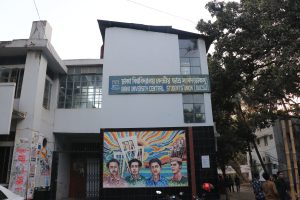The Islami Chatra Shibir (ICS), the student wing of Bangladesh’s largest Islamist party, the Jamaat e Islami, and candidates it backed have won sweeping victories in the student union elections at two of the country’s most important public universities: Dhaka University (DU) in the heart of Dhaka, and Jahangirnagar University (JU), situated in Savar, in the capital’s outskirts.
In the Dhaka University Central Students’ Union (DUCSU) elections, ICS-backed candidates won 23 of 28 posts in the central committee, including those of vice president and general secretary. In the Jahangirnagar University Central Students’ Union (JUCSU) elections, ICS-backed candidates won 20 of 25 posts, including those of general secretary and two assistant general secretaries.
The student wing of the Bangladesh Nationalist Party (BNP), Bangladesh Jatiotabadi Chatradal (JCD); and left and progressive student organizations, including Shompritir Oikya, Songsoptok Parishad, Shadhin Aongikar Parishad, and a partial panel of Socialist Students’ Front had withdrawn from and boycotted the JUCSU elections, citing irregularities. They alleged that the ICS had engineered the elections. University authorities dismissed their claims and proceeded with the election process.
During Awami League rule, both DU and JU were strongholds of the mainstream, liberal, and left student wings, whereas the ICS was not allowed to operate publicly.
DU has played a significant role in Bangladesh’s political history. Pre-independence, it was a key center of student-led resistance and has been duly recognized for its significant role in the language movement of 1952, the student-led mass uprising in 1969, and other protests against Pakistan.
During Bangladesh’s liberation war in 1971, Jamaat activists who collaborated with the Pakistani military killed intellectuals and professors of Dhaka University as they had played a key role in shaping Bengali nationalism. Given their opposition to Bangladesh’s struggle for independence, the Jamaat and the ICS were unable to build support on university campuses for decades.
The ICS’ recent victory in students’ union elections is therefore historic, and points to six emerging patterns in Bangladeshi politics.
First, it indicates that urban youth have less faith in mainstream politics. The repression unleashed by Sheikh Hasina’s Awami League government was matched by the violence and intimidation of its student wing, the Bangladesh Chhatra League (BCL). Many university students were therefore repelled by the mainstream political student organizations. Against this backdrop, the ICS advanced a fear-mongering campaign in the run-up to the recent students’ union elections that the JCD was no different from the BCL. The election results reveal that the ICS campaign received some traction.
Second, an increasing number of Bangladeshi youth are leaning toward right-wing conservative politics, a trend that is visible elsewhere in South Asia (as in India, for example) as well as further afield in the U.S. and several European countries. The narrative of corruption and repression in mainstream politics has given rise to a false perception that Islamists are incorruptible and they hold the moral high ground.
Third, the election results do not bode well for the National Citizen Party (NCP), which was formed recently by students who led the anti-Hasina protests last year. The NCP-backed Bangladesh Gonotantrik Chhatra Sangsad (BGCS) performed poorly in the student union elections in DU and JU. One would have thought that after Hasina’s ouster, for which it claimed credit, the NCP would have secured most of the youth votes in the two campuses. However, it did not. It shows that while some student leaders were the face of the resistance, it was the masses and organizational strength of political parties like the BNP and the Jamaat that comprised the bulk of the protesters who brought down the Hasina regime. The NCP is now considering merging with VP Nur’s Gono Odhikar Parishad.
Fourth, these elections demonstrate that the Jamaat and ICS have established significant influence within the university administrations. Critics of the Jamaat have been pointing out that the Islamist party has infiltrated public institutions and that their supporters and activists are pushing forward the Jamaat’s agenda from within these institutions. For example, the BNP Senior Joint Secretary recently accused the Jamaat of building a state within a state. The election results indicate the extent to which the clout of the Islamists has grown in universities.
Fifth, these elections underscore the disconnection between youth voters and the BNP. The BNP is still likely to win the general elections and form the new government. However, allegations of extortion by some BNP activists were amplified by the party’s opponents and they have been successful in creating a negative image of the BNP among young voters.
Finally, the ICS’ win also indicates that they are moving away from traditional Islamist politics and liberalizing their political approach. They supported candidates, such as Sarva Mitra Chakma, who is of an indigenous non-Muslim background, and non-conservative women like Fatema Tasnim Zuma.
Some of these dynamics will play out in the upcoming general elections in Bangladesh. An important factor that will determine the outcome is the Awami League and its traditional voters. The party has been banned and cannot contest in the next election. AL sympathizers are said to comprise 15-25 percent of Bangladesh’s electorate.
Whom they decide to vote for could determine the winner of the next elections.





























